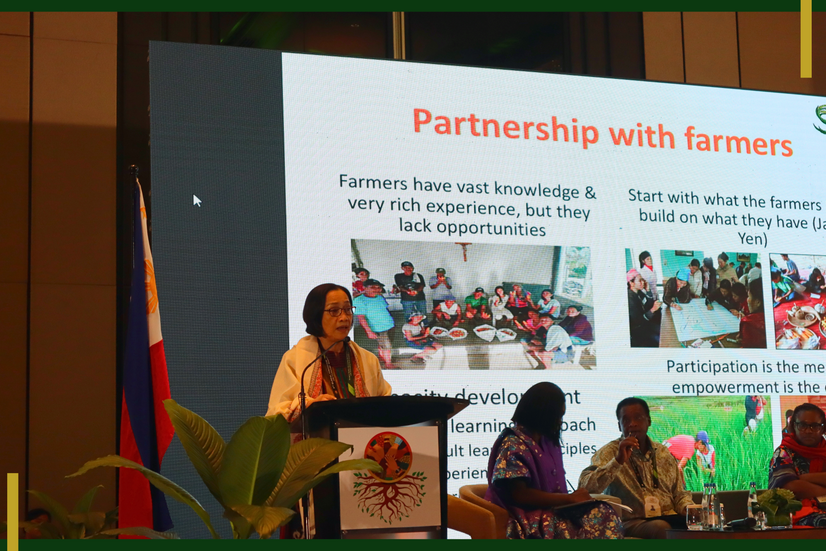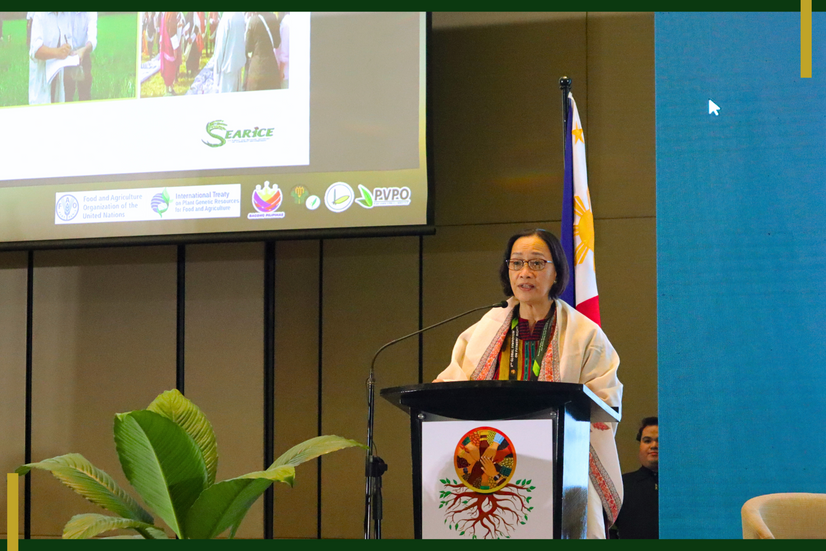Planting Partnerships: Reimagining Cooperation for Farmers’ Rights
- Sep 29, 2025
- 3 min read
Like seeds, partnerships only grow when planted in the right soil. Some wither when forced into conditions that don’t nourish them; others thrive when nurtured with respect, trust, and shared purpose.
At the 2nd Global Symposium on Farmers’ Rights, SEARICE Executive Director Normita Ignacio was among the presenters in Session 3, “Opportunities for cooperation, collaboration, and partnerships to strengthen the implementation of Farmers’ Rights.” She underscored that genuine collaboration is not about hierarchy or control, but about creating spaces where farmers who are too often treated as mere recipients of technology can stand as co-innovators and decision-makers.
Farmers as Knowledge Holders
SEARICE’s work begins from a fundamental recognition: farmers are experts in their own right. Yet, this expertise has often been dismissed or ignored. To reach and amplify farmers’ knowledge, SEARICE has relied on Farmer Field Schools (FFS), a methodology grounded in adult learning principles. Through discovery-based, experiential learning, FFS ensures that farmers start from what they already know, building confidence and capacity in the process.
For Ignacio, participation is not the end goal but the means. The true measure of partnership is whether it leads to empowerment, enabling farmers to trust their own knowledge, see their potential, share it with others, and claim a seat in decision-making spaces.
Equity and Inclusion at the Core
Ignacio also reminded participants that partnerships must be attentive to the realities of women, youth, and Indigenous peoples. Women’s central role in conserving seeds and biodiversity must translate into tangible benefits, not just figurative presence. Youth engagement, meanwhile, is urgent: farming continues to lose its appeal under conditions of neglect and poor policies. Without restoring dignity and ensuring viability in farming, future generations may abandon the fields altogether.
Similarly, Indigenous communities bring distinct knowledge systems and cultural practices that must be respected. Partnerships that ignore their realities risk further marginalization and loss of traditional knowledge and farmer seed systems.
Partnerships Beyond Borders
SEARICE’s collaborations extend beyond farming communities to universities, research institutions, and government agencies. But Ignacio was clear: these relationships only work when power is shared. Institutions must treat farmers as equals, not as passive recipients of scientific knowledge, technology and innovation or subjects of extractive research.
At the international level, Ignacio underscored the importance of linking Farmers’ Rights with broader frameworks, including the UN Declaration on the Rights of Peasants (UNDROP) and the Kunming-Montreal Global Biodiversity Framework. Farmers’ Rights, she argued, cannot be treated as a separate silo but must be integrated across conservation, sustainable use, and benefit-sharing commitments of the Plant Treaty.
A Call for Collaboration Without Hierarchy
Ignacio closed her presentation by situating partnerships as both opportunity and responsibility. To be meaningful, partnerships must:
Affirm farmers as innovators and rights-holders, not just laborers in food systems.
Guarantee equity and inclusion for women, youth, and marginalized groups.
Respect Indigenous knowledge systems and local realities.
Ensure policies and institutions empower rather than restrict, especially the right to save, exchange, and sell seeds.

During the open forum, a participant from the private sector shared that he was interested in working with NGOs but was still uncertain, reflecting the wider tensions between the private seed industry and discussions on Farmers’ Rights. Ignacio responded by stressing that SEARICE is open to partnerships of all kinds, but only if they remain centered on farmers. If the objectives and goals are aligned in supporting farmers’ rights and dignity, then collaboration is not only possible, but necessary. At the heart of it, all efforts must serve farmers.
Dr. Yiching Song, founder of the Farmers’ Seeds Network in China, also praised Ignacio’s conclusion and SEARICE’s rights-based approach, noting the importance of integrating human rights into the implementation of Farmers’ Rights. Asked to elaborate, Ignacio emphasized once more the importance of using the appropriate methodology, one that respects farmers’ knowledge, builds confidence, and leads to genuine empowerment.
Farmers’ Rights cannot be advanced piecemeal. They must be woven into every discussion on conservation, sustainable use, and access to plant genetic resources. Just as a seed flourishes only when soil, water, and sunlight work together, partnerships can only succeed when rooted in respect and shared purpose. Collaboration without hierarchy, where farmers stand as co-equals is not only possible but necessary if we are to build resilient, just, and sustainable food systems for generations to come.
Collaboration, like farming, fails when it is top-down; it thrives only when farmers’ hands are on the plow. For if farmers are the roots of our food systems, then collaboration must be the rain that sustains them — never the storm that washes them away.









